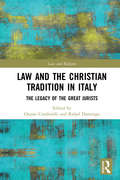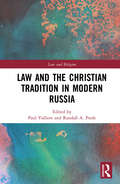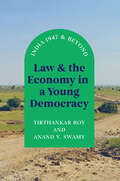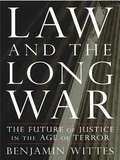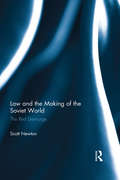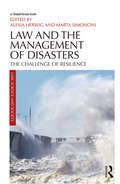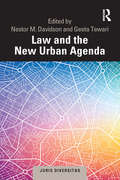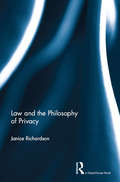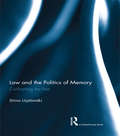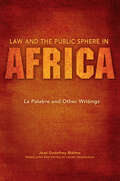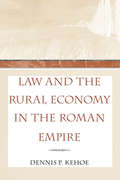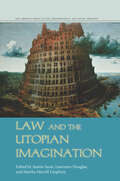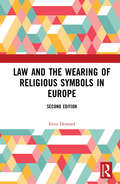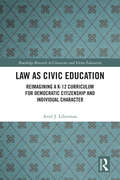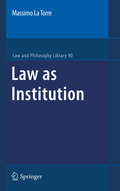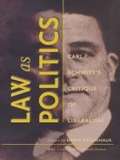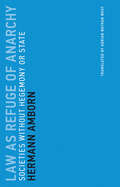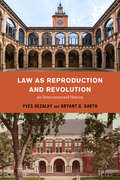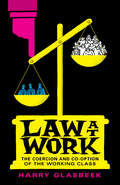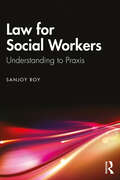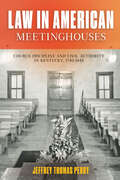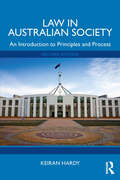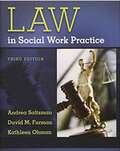- Table View
- List View
Law and the Christian Tradition in Italy: The Legacy of the Great Jurists (Law and Religion)
by Rafael Domingo Orazio CondorelliFirmly rooted on Roman and canon law, Italian legal culture has had an impressive influence on the civil law tradition from the Middle Ages to present day, and it is rightly regarded as "the cradle of the European legal culture." Along with Justinian’s compilation, the US Constitution, and the French Civil Code, the Decretum of Master Gratian or the so-called Glossa ordinaria of Accursius are one of the few legal sources that have influenced the entire world for centuries. This volume explores a millennium-long story of law and religion in Italy through a series of twenty-six biographical chapters written by distinguished legal scholars and historians from Italy and around the world. The chapters range from the first Italian civilians and canonists, Irnerius and Gratian in the early twelfth century, to the leading architect of the Second Vatican Council, Pope Paul VI. Between these two bookends, this volume offers notable case studies of familiar civilians like Bartolo, Baldo, and Gentili and familiar canonists like Hostiensis, Panormitanus, and Gasparri but also a number of other jurists in the broadest sense who deserve much more attention especially outside of Italy. This diversity of international and methodological perspectives gives the volume its unique character. The book will be essential reading for academics working in the areas of Legal History, Law and Religion, and Constitutional Law and will appeal to scholars, lawyers, and students interested in the interplay between religion and law in the era of globalization.
Law and the Christian Tradition in Modern Russia (Law and Religion)
by Paul Valliere and Randall A. PooleThis book, authored by an international group of scholars, focuses on a vibrant central current within the history of Russian legal thought: how Christianity, and theistic belief generally, has inspired the aspiration to the rule of law in Russia, informed Russian philosophies of law, and shaped legal practices. Following a substantial introduction to the phenomenon of Russian legal consciousness, the volume presents twelve concise, non-technical portraits of modern Russian jurists and philosophers of law whose thought was shaped significantly by Orthodox Christian faith or theistic belief. Also included are chapters on the role the Orthodox Church has played in the legal culture of Russia and on the contribution of modern Russian scholars to the critical investigation of Orthodox canon law. The collection embraces the most creative period of Russian legal thought—the century and a half from the later Enlightenment to the Russian emigration following the Bolshevik Revolution. This book will merit the attention of anyone interested in the connections between law and religion in modern times.
Law and the Economy in a Young Democracy: India 1947 and Beyond (Markets and Governments in Economic History)
by Tirthankar Roy Anand V. SwamyAn essential history of India's economic growth since 1947, including the legal reforms that have shaped the country in the shadow of colonial rule. Economists have long lamented how the inefficiency of India's legal system undermines the country’s economic capacity. How has this come to be? The prevailing explanation is that the postcolonial legal system is understaffed and under-resourced, making adjudication and contract enforcement slow and costly. Taking this as given, Law and the Economy in a Young Democracy examines the contents and historical antecedents of these laws, including how they have stifled economic development. Economists Roy and Swamy argue that legal evolution in independent India has been shaped by three factors: the desire to reduce inequality and poverty; the suspicion that market activity, both domestic and international, can be detrimental to these goals; and the strengthening of Indian democracy over time, giving voice to a growing fraction of society, including the poor. Weaving the story of India's heralded economic transformation with its social and political history, Roy and Swamy show how inadequate legal infrastructure has been a key impediment to the country's economic growth during the last century. A stirring and authoritative history of a nation rife with contradictions, Law and the Economy in a Young Democracy is essential reading for anyone seeking to understand India's current crossroads—and the factors that may keep its dreams unrealized.
Law and the Economy in a Young Democracy: India 1947 and Beyond (Markets and Governments in Economic History)
by Tirthankar Roy Anand V. SwamyAn essential history of India's economic growth since 1947, including the legal reforms that have shaped the country in the shadow of colonial rule. Economists have long lamented how the inefficiency of India's legal system undermines the country’s economic capacity. How has this come to be? The prevailing explanation is that the postcolonial legal system is understaffed and under-resourced, making adjudication and contract enforcement slow and costly. Taking this as given, Law and the Economy in a Young Democracy examines the contents and historical antecedents of these laws, including how they have stifled economic development. Economists Roy and Swamy argue that legal evolution in independent India has been shaped by three factors: the desire to reduce inequality and poverty; the suspicion that market activity, both domestic and international, can be detrimental to these goals; and the strengthening of Indian democracy over time, giving voice to a growing fraction of society, including the poor. Weaving the story of India's heralded economic transformation with its social and political history, Roy and Swamy show how inadequate legal infrastructure has been a key impediment to the country's economic growth during the last century. A stirring and authoritative history of a nation rife with contradictions, Law and the Economy in a Young Democracy is essential reading for anyone seeking to understand India's current crossroads—and the factors that may keep its dreams unrealized.
Law and the Long War
by Benjamin WittesAn authoritative assessment of the new laws of war and a sensible and sophisticated roadmap for the future of liberty in the Age of Terror America is losing a crucial front in the ongoing war on terror. It is losing not to Al Qaeda, but to its own failure to construct a set of laws that will protect the American people during this global conflict. As debate continues to rage over the legality and ethics of war, Benjamin Wittes enters the fray with a sober-minded exploration of law in wartime that is definitive, accessible, and nonpartisan. Outlining how this country came to its current impasse over human rights and counterterrorism, Law and the Long War paves the way toward fairer, more accountable rules for a conflict without end. .
Law and the Making of the Soviet World: The Red Demiurge
by Scott NewtonThis book is an unconventional reappraisal of Soviet law: a field that is ripe for re-evaluation, now that it is clear of Cold War cobwebs; and, as this book shows, one that is surprisingly topical and newly compelling. Scott Newton argues here that the Soviet order was a work of law. Drawing on a wide range of sources – including Russian-language Soviet statues and regulations, jurisprudence, legal theory, and English-language ‘legal Kremlinology’ – this book analyses the central significance of law in the design and operation of Soviet economic, political, and social institutions. In arguing that it was an exemplary, rather than aberrant, case of the uses to which law was put in twentieth-century industrialised societies, Law and the Making of the Soviet World: The Red Demiurge provides an insightful account of both the significance of modern law in the Soviet case and the significance of the Soviet case for modern law.
Law and the Management of Disasters: The Challenge of Resilience (Law, Science and Society)
by Marta Simoncini Alexia HerwigDisasters raise serious challenges for contemporary legal orders: they demand significant management, but usually amidst massive disruption to the normal functioning of state authority and society. When dealing with disasters, law has traditionally focused on contingency planning and recovery. More recently, however, ‘resilience’ has emerged as a key concept in effective disaster management policies and strategies, aiming at minimising the impact of events, so that the normal functioning of society and the state can be preserved. This book analyses the contribution of law to resilience building by looking at law’s role in the different phases of the disaster regulatory process: risk assessment, risk management, emergency intervention, and recovery. More specifically, it addresses how law can effectively contribute to resilience-oriented distaster management policies, and what legal instruments can support effective resilience-building.
Law and the New Developmental State
by David M. Trubek Helena Alviar Garcia Diogo R. Coutinho Alvaro Santos David M. Trubek Helena Alviar Garcia Diogo R. CoutinhoThis book explores the emergence of a new developmental state in Latin America and its significance for law and development theory. In Brazil since 2000, emerging forms of state activism, including a new industrial policy and a robust social policy, differ from both classic developmental state and neoliberal approaches. They favor a strong state and a strong market, employ public-private partnerships, seek to reduce inequality, and embrace the global economy. Case studies of state activism and law in Brazil show new roles emerging for legal institutions. They describe how the national development bank uses law in innovation promotion, trade law strengthens new developmental policies in export promotion and public health, and social law frames innovative poverty-relief programs that reduce inequality and stimulate demand. Contrasting Brazilian experience with Colombia and Mexico, the book underscores the unique features of Brazil's trajectory and the importance of this experience for understanding the role of law in development today.
Law and the New Urban Agenda: A Comparative Perspective (Juris Diversitas)
by Nestor M. Davidson Geeta TewariThe New Urban Agenda (NUA), adopted in 2016 at the United Nations Conference on Housing and Sustainable Urban Development (Habitat III) in Quito, Ecuador, represents a globally shared understanding of the vital link between urbanization and a sustainable future. At the heart of this new vision stand a myriad of legal challenges – and opportunities – that must be confronted for the world to make good on the NUA’s promise. In response, this book, which complements and expands on the editors’ previous volumes on urban law in this series, offers a constructive and critical evaluation of the legal dimensions of the NUA. As the volume’s authors make clear, from natural disasters and resulting urban migration in Honshu and Tacloban, to innovative collaborative governance in Barcelona and Turin, to accessibility of public space for informal workers in New Delhi and Accra, and power scales among Brazil’s metropolitan regions, there is a deep urgency for thoughtful research to understand how law can be harnessed to advance the NUA’s global mission of sustainable urbanism. It thus creates a provocative and academic dialogue about the legal effects of the NUA, which will be of interest to academics and researchers with an interest in urban studies.
Law and the Philosophy of Privacy
by Janice RichardsonSituating privacy within the context of political philosophy, this book highlights the way in which struggles concerning the meaning of privacy have always been political. Different conceptions of privacy are here shown to involve diverse assumptions about ontology: our conceptions of self, culture, society and communication. Privacy theory’s debt to Locke, Kant or Mill, and what is at stake in their conceptual frameworks, is examined. The extent to which the term "privacy" has been used to the detriment of - and to create - weaker parties in marriage, in the workplace and now as citizens (or non-citizens) and consumers, as well as employees, is also demonstrated. In contrast, Janice Richardson pursues the relevance of Floridi’s philosophy of information, before turning to her application of Spinoza, the philosopher of communication, in order to outline a more useful framework through which to think about privacy today. The book will be of interest to those working in political philosophy, feminist philosophy, law, the philosophy of information, sociology, media, and cultural studies.
Law and the Politics of Memory: Confronting the Past
by Stiina LoytomakiLaw and the Politics of Memory: Confronting the Past examines law’s role as a tool of memory politics in the efforts of contemporary societies to work through the traumas of their past. Using the examples of French colonialism and Vichy, as well as addressing the politics of memory surrounding the Holocaust, communism and colonialism, this book provides a critical exploration of law’s role in ‘belated’ transitional justice contexts. The book examines how and why law has become so central in processes in which the past is constituted as a series of injustices that need to be rectified and can allegedly be repaired. As such, it explores different legal modalities in processes of working through the past; addressing the implications of regulating history and memory through legal categories and legislative acts, whilst exploring how trials, restitution cases, and memory laws manage to fulfil such varied expectations as clarifying truth, rendering homage to memory and reconciling societies. <P><P> Legal scholars, historians and political scientists, especially those working with transitional justice, history and memory politics in particular, will find this book a stimulating exploration of the specificity of law as an instrument and forum of the politics of memory.
Law and the Public Sphere in Africa: La Palabre and Other Writings (World Philosophies)
by Jean Godefroy BidimaA pioneering collection of essays that casts “an invigorating light on law, politics, public language and social practice in modern Africa” (Africa).Jean Godefroy Bidima’s La Palabre examines the traditional African institution of palaver as a way to create dialogue and open exchange in an effort to resolve conflict and promote democracy. In the wake of South Africa’s Truth and Reconciliation Commissions and the gacaca courts in Rwanda, Bidima offers a compelling model of how to develop an African public space where dialogue can combat misunderstanding. This volume, which includes other essays on legal processes, cultural diversity, memory, and the internet in Africa, offers English-speaking readers the opportunity to become acquainted with a highly original and important postcolonial thinker.“Bidima has done a very important work here which deserves the critical attention of philosophers, political theorists, legal scholars as well the general public.” —Journal of Modern African Studies“Opens promising vistas for legal and political discourse. Its multidisciplinary orientation and the erudition of the author make for a text that has crossover appeal.” —Olúfémi Táíwò, Cornell University“Presents a valuable philosophical argument that will most certainly be of interest to those working on the topics of postconflict justice, peacebuilding, and democratization in Africa.” —African Conflict and Peacebuilding Review
Law and the Rural Economy in the Roman Empire
by Dennis P. KehoeThe economy of the Roman Empire was predominantly agrarian: Roman landowners, agricultural laborers, and small tenant farmers were highly dependent upon one another for assuring stability. By examining the property rights established by the Roman government, in particular the laws concerning land tenure and the contractual relationships between wealthy landowners and the tenant farmers to whom they leased their land, Dennis P. Kehoe is able to demonstrate how the state fostered economic development and who benefited the most. In this bold application of economic theory, Kehoe explores the relationship between Roman private law and the development of the Roman economy during a crucial period of the Roman Empire, from the second to the fourth century C.E. Kehoe is able to use the laws concerning land tenure, and the Roman government's enforcement of those laws, as a window through which to develop a more comprehensive view of the Roman economy. With its innovative application of the methodologies of law and economics and the New Institutional Economics Law and the Rural Economy in the Roman Empire is a groundbreaking addition to the study of the Roman economy.
Law and the Utopian Imagination
by Austin Sarat Lawrence Douglas Martha Merrill UmphreyLaw and the Utopian Imagination seeks to explore and resuscitate the notion of utopianism within current legal discourse. The idea of utopia has fascinated the imaginations of important thinkers for ages. And yet#151;who writes seriously on the idea of utopia today? The mid-century critique appears to have carried the day, and a belief in the very possibility of utopian achievements appears to have flagged in the face of a world marked by political instability, social upheaval, and dreary market realities. Instead of mapping out the contours of a familiar terrain, this book seeks to explore the possibilities of a productive engagement between the utopian and the legal imagination. The book asks: is it possible to re-imagine or revitalize the concept of utopia such that it can survive the terms of the mid-century liberal critique? Alternatively, is it possible to re-imagine the concept of utopia and the theory of liberal legality so as to dissolve the apparent antagonism between the two? In charting possible answers to these questions, the present volume hopes to revive interest in a vital topic of inquiry too long neglected by both social thinkers and legal scholars.
Law and the Wearing of Religious Symbols in Europe
by Erica HowardWritten in accessible language, this book provides a comprehensive analysis of a topical subject that is being widely debated across Europe. The work presents an overview of emerging case law from the European Court of Human Rights and the Court of Justice of the European Union, as well as from national courts and equality bodies in European countries, on the wearing of religious symbols in public spaces. The author persuasively argues that bans on the wearing of religious symbols constitutes a breach of an individual’s human rights and contravene existing anti-discrimination legislation. Fully updated to take account of recent case law, this second edition has been expanded to consider bans in public spaces more generally, including employment, an area where some of the recent developments have taken place.
Law as Civic Education: Reimagining a K-12 Curriculum for Democratic Citizenship and Individual Character (Routledge Research in Character and Virtue Education)
by Ariel LibermanIf a civic education is the essential foundation for a functioning, discursive democracy, how should it be taught? This book offers an innovative solution, arguing that far from abandoning the often- grand promise of civic education as a means of cultivating reasoning skills and democratic character, we should embrace it, and proposes a reimagined civic education based on teaching students in primary and secondary school law and legal reasoning.Drawing on a range of theoretical disciplines— law, philosophy, ethics, sociology, psychology, and moral educational and child development theory— this monograph justifies the benefits of law learning as a form of character and civic education and offers historical and comparative educational examples to show what is possible. It demonstrates how legal teaching can be incorporated into a K- 12 curriculum and argues that such training can be transformative, guiding students to become citizens capable of meeting the demands of democracy: citizens with stronger reasoning skills, a motivation to self- examine their values and beliefs and bring them into conversation with social values, and an ability to effectively navigate political institutions and participate in public discourse.This compelling and deeply original work will be of interest to scholars and educators in the fields of civic education, character and virtue education, legal studies, and philosophy of education.
Law as Institution
by Massimo La TorreThe book's argument moves from discussing the relation between law and power. Theories defending the primacy of law over power are played against doctrines which center around the prevailing role of law. Legal positivism and natural law are here the real issue at stake. Constitutionalism and the rule of law are then seen as a development of the modern natural law tradition. But the book's main move is a consideration of law as a phenomenon possibly connected with language. Once traditional imperativist strategies are seen as unsatisfactory, and nevertheless law is accepted as being a social fact, there is the possibility of addressing such fact as somehow analogically linked with a system of language. In a sense, language is thought of as fundamental or primordial ontological dimension, so that this can offer the key to address and understand the question of what reality is. The question of meaning overlaps that of being, not only as far as the being of the world is concerned but also with respect to the nature of law. The concept of law -could not be approached without addressing the issue of law as a language. To this purpose "use theory" is assessed and taken as a possible candidate to build up a sensible theory of legal validity. From this angle institutionalism is then seen to be the most fruitful approach to conceptualize the ontology of law, though some reform in the standard theory and in its more recent developments is proposed to render more plausible the notion of "institution". Finally, the strong normative side of a (legal) institution is studied. The relation of law and morality is assessed by pointing out the difference between the "constitutive" character of law and the "regulative" core of morality. However, an institution is both an "is" and an "ought", while law is at the same time "facticity" and "normativity.
Law as Politics: Carl Schmitt’s Critique of Liberalism
by David DyzenhausWhile antiliberal legal theorist Carl Schmitt has long been considered by Europeans to be one of this century's most significant political philosophers, recent challenges to the fundamental values of liberal democracies have made Schmitt's writings an unavoidable subject of debate in North America as well. In an effort to advance our understanding not only of Schmitt but of current problems of liberal democracy, David Dyzenhaus presents translations of classic German essays on Schmitt alongside more recent writings by distinguished political theorists and jurists. Neither a defense of nor an attack on Schmitt, Law as Politics offers the first balanced response to his powerful critique of liberalism. One of the major players in the 1920s debates, an outspoken critic of the Versailles Treaty and the Weimar Constitution, and a member of the Nazi party who provided juridical respectability to Hitler's policies, Schmitt contended that people are a polity only to the extent that they share common enemies. He saw the liberal notion of a peaceful world of universal citizens as a sheer impossibility and attributed the problems of Weimar to liberalism and its inability to cope with pluralism and political conflict. In the decade since his death, Schmitt's writings have been taken up by both the right and the left and scholars differ greatly in their evaluation of Schmitt's ideas. Law as Politics thematically organizes in one volume the varying engagements and confrontations with Schmitt's work and allows scholars to acknowledge--and therefore be in a better position to negotiate--an important paradox inscribed in the very nature of liberal democracy. Law as Politics will interest political philosophers, legal theorists, historians, and anyone interested in Schmitt's relevance to current discussions of liberalism.Contributors. Heiner Bielefeldt, Ronald Beiner, Ernst-Wolfgang Bockenforde, Renato Cristi, David Dyzenhaus, Robert Howse, Ellen Kennedy, Dominique Leydet, Ingeborg Maus, John P. McCormick, Reinhard Mehring, Chantal Mouffe, William E. Scheuerman, Jeffrey Seitzer
Law as Refuge of Anarchy: Societies without Hegemony or State (Untimely Meditations #15)
by Hermann AmbornA study of communities in the Horn of Africa where reciprocity is a dominant social principle, offering a concrete countermodel to the hierarchical state.Over the course of history, people have developed many varieties of communal life; the state, with its hierarchical structure, is only one of the possibilities for society. In this book, leading anthropologist Hermann Amborn identifies a countermodel to the state, describing communities where reciprocity is a dominant social principle and where egalitarianism is a matter of course. He pays particular attention to such communities in the Horn of Africa, where nonhierarchical, nonstate societies exist within the borders of a hierarchical structured state. This form of community, Amborn shows, is not a historical forerunner to monarchy or the primitive state, nor is it obsolete as a social model. These communities offer a concrete counterexample to societies with strict hierarchical structures.Amborn investigates social forms of expression, ideas, practices, and institutions that oppose the hegemony of one group over another, exploring how conceptions of values and laws counteract tendencies toward the accumulation of power. He examines not only how the nonhegemonic ethos is reflected in law but also how anarchic social formations can exist. In the Horn of Africa, the autonomous jurisdiction of these societies protects against destructive outside influences, offers a counterweight to hegemonic violence, and contributes to the stabilization of communal life. In an era of widespread dissatisfaction with Western political systems, Amborn's study offers an opportunity to shift from traditional theories of anarchism and nonhegemony that project a stateless society to consider instead stateless societies already in operation.
Law as Reproduction and Revolution: An Interconnected History
by Bryant G. GarthA free open access ebook is available upon publication. Learn more at www.luminosoa.org This sweeping book details the extent to which the legal revolution emanating from the US has transformed legal hierarchies of power across the globe, while also analyzing the conjoined global histories of law and social change from the Middle Ages to today. It examines the global proliferation of large corporate law firms—a US invention—along with US legal education approaches geared toward those corporate law firms. This neoliberal-inspired revolution attacks complacent legal oligarchies in the name of America-inspired modernism. Drawing on the combined histories of the legal profession, imperial transformations, and the enduring and conservative role of cosmopolitan elites at the top of legal hierarchies, the book details case studies in India, Hong Kong, South Korea, Japan, and China to explain how interconnected legal histories are stories of both revolution and reproduction. Theoretically and methodologically ambitious, it offers a wholly new approach to studying interrelated fields across time and geographies.
Law at Work: The Coercion and Co-option of the Working Class
by Harry GlasbeekIn a series of illuminating essays, the renowned Harry Glasbeek unpacks how law has been used to ensure that workers' aspirations are kept in check. Law at Work uncovers how the legal system, through its structures and mechanisms, legitimizes and reinforces the exploitation of workers. Using historic and contemporary examples, Glasbeek illustrates how conscious manipulations of law are part and parcel of how law protects capitalists at the expense of workers. He proves how the very laws designed to safeguard rights and freedoms often act as invisible shackles, compelling readers to reflect on their own struggles as they navigate a world where the legal system fails to serve their interests. These manipulations are made to look innocent because the underlying structures and ideology which give rise to specific rules are not challenged or challengeable. This thought-provoking book is an indispensable resource for those seeking to understand the hidden dynamics of worker oppression, empowering readers to question prevailing narratives and envision a future where the law truly serves the interests of all.
Law for Social Workers: Understanding to Praxis
by Sanjoy RoyThis book examines the intersection of legal and social work in India and beyond. It explores the complex reality of laws related to socially disadvantaged groups and how social workers and practitioners navigate it at the ground level.This volume comprehensively analyses how social workers implement strategies and processes effectively through legal frameworks for their clientele. With a blend of theory and hands-on advice, it will enable students to gain a deeper and critical understanding of their roles in making a positive impact in the lives of individuals and communities through legal support. It shifts focus from normative legal concepts and systems to action-oriented roles in the contexts of individuals, families, communities, and organizations. From circumnavigating legal frameworks to implementing effective social work processes and strategies, this book serves as an invaluable resource for anyone seeking to make a positive impact in terms of empowering their community.This book will be useful to students, researchers, educators, and practitioners of social work, sociology, human rights, public policy, and administration. It will also be an invaluable resource for professionals, including those working for the government or NGOs.
Law in American Meetinghouses: Church Discipline and Civil Authority in Kentucky, 1780–1845
by Jeffrey Thomas PerryA revealing look at the changing role of churches in the decades after the American Revolution.Most Americans today would not think of their local church as a site for arbitration and would probably be hesitant to bring their property disputes, moral failings, or personal squabbles to their kin and neighbors for judgment. But from the Revolutionary Era through the mid-nineteenth century, many Protestants imbued local churches with immense authority. Through their ritual practice of discipline, churches insisted that brethren refrain from suing each other before "infidels" at local courts and claimed jurisdiction over a range of disputes: not only moral issues such as swearing, drunkenness, and adultery but also matters more typically considered to be under the purview of common law and courts of equity, including disputes over trespass, land, probate, slave warranty, and theft. In Law in American Meetinghouses, Jeffrey Thomas Perry explores the ways that ordinary Americans—Black and white, enslaved and free—understood and created law in their local communities, uncovering a vibrant marketplace of authority in which church meetinghouses played a central role in maintaining their neighborhoods' social peace. Churches were once prominent sites for the creation of local law and in this period were a primary arena in which civil and religious authority collided and shaped one another. When church discipline failed, the wronged parties often pushed back, and their responses highlight the various forces that ultimately hindered that venue's ability to effectively arbitrate disputes between members. Relying primarily on a deep reading of church records and civil case files, Perry examines how legal transformations, an expanding market economy, and religious controversy led churchgoers to reimagine their congregations' authority. By the 1830s, unable to resolve doctrinal quibbles within the fellowship, church factions turned to state courts to secure control over their meetinghouses, often demanding that judges wade into messy ecclesiastical disputes. Tracking changes in disciplinary rigor in Kentucky Baptist churches from that state's frontier period through 1845, and looking beyond statutes and court decrees, Law in American Meetinghouses is a fresh take on church-state relations. Ultimately, it highlights an oft-forgotten way that Americans subtly repositioned religious institutions alongside state authority.
Law in Australian Society: An Introduction to Principles and Process
by Keiran HardyWhat is the ‘rule of law'? How do laws get made? Does our legal and political system achieve justice for all Australians equally? Designed for beginners as well as non-law students, this textbook provides a comprehensive and accessible guide to understanding Australia's system of law and government.Law in Australian Society explains legislation and case law, courts, and the doctrine of precedent. Keiran Hardy examines the roles played by parliaments, politics, and the media. He explains founding principles, including democracy, liberalism, the separation of powers, and federalism. Human rights and justice are highlighted, with an emphasis on First Nations Peoples and the law. The book explains criminal responsibility and the justice system, including police powers and the criminal trial. It concludes with case studies of cybercrime and counterterrorism laws to illustrate law reform in action. This second edition has been fully updated throughout, including recent legislation, cases, and topical issues from Australian law and politics, including from the COVID-19 pandemic and the recent referendum on an Indigenous Voice to Parliament. Each chapter features practical examples, chapter summaries and review questions together with a glossary of key terms. Concise, accessible and up-to-the-minute, this is a vital guide for anyone seeking to understand Australian law and government.
Law in Social Work Practice
by Andrea Saltzman David M. Furman Kathleen OhmanWritten by an author team educated in both the law and social work, this book acquaints readers with major state and federal laws, regulations, and court opinions that directly affect social work practice. <p><p>LAW IN SOCIAL WORK PRACTICE, 3rd Edition helps readers understand how to work within the legal system to benefit clients and further client interests, recognize certain client problems as legal, and work effectively with lawyers, as well as how the law shapes and restricts clients' actions. It also addresses how the law regulates social work practice, and how to recognize and respect the rights of clients and others affected by a practitioner's actions.
